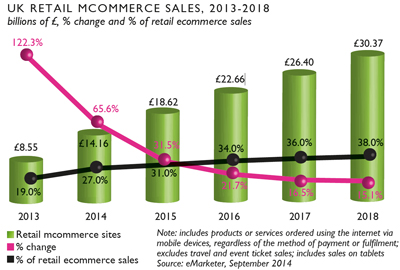This post is by Louise Twycross-Lewis
Mobile is increasingly becoming the number-one platform for digital transactions, with smartphones set to become the dominant device.
The UK continues to be a global leader of mobile transactions according to a recent eMarketer report. This year, mobile ecommerce (mcommerce) will account for 31.5% of the UK's total retail digital sales, amounting to £18.6 billion. This is in the context of where digital buying is becoming the norm – it is estimated that 74.3% of the UK population will be digital purchasers in 2015, which is well above the 22.6% global average.
eMarketer estimates that mcommerce will rise to 34% of all digital sales (worth £22.7 billion) next year, but some commentators go further and suggest it could exceed 50% in 2016 (Source: Criteo – Ad Week Europe).
Quarter 4 2014 trends really demonstrate the importance of mcommerce with Christmas period sales seeing huge growth, up 55% year on year and reaching £8.0 billion (Source: IMRG and Capgemini). Mobile as a percentage of UK retail site traffic was dominant, accounting for 60% on Black Friday and 56% on Cyber Monday. this trend is also present when looking at mobile as a percentage of ecommerce sales – accounting for 47% of Black Friday sales and 56% on Cyber Monday.

The ever-increasing role of mcommerce was highlighted at a recent 2015 Advertising Week Europe session where Jonathan Wolf (chief product officer at Criteo) outlined some of his predictions for the year ahead:
-
The smartphone will be the dominant device for mcommerce. although tablets currently outweigh smartphones for mobile transactions, Wolf predicts that the UK will begin to follow a similar pattern to that of the US and other markets, where the majority of mobile transactions are made through smartphones.
-
Apps will become the preferred mechanic for mobile purchases. Wolf stated that the usage of shopping apps has grown by over 170% year on year, making it the fastest-growing category. the gaming category, in comparison, only grew by 30% (despite the popularity of candy crush saga, clash of clans and minecraft). the fashion and luxury categories have seen the majority of mobile transactions, and home products, the least.
-
With an average of four devices per household, an increasing number of purchases will involve the use of multiple devices. criteo research has revealed that 68% of UK shoppers use multiple devices when purchasing a product online at least half of the time. it will be important for brands to understand consumers¡¦ browsing behaviour across devices and their journey from consideration to sale. One way they can do this will be by using universal match to identify users across multiple devices. this will enable brands to show a relevant ad to the same user irrespective of whether they are accessing content from a desktop or mobile device.
Brands will need to maximise their mobile offerings
Wolf states that 86% of ecommerce retailers claim to have a mobile-optimised site, but only 13% of consumers rate these websites as 'very good'. Brands know they need to ensure their mobile experiences meet consumer needs and expectations, and there is much emphasis on improving this moving forwards. 67% of retailers from Criteo's retail mobile pulse survey expect to increase their spending on mobile-optimised sites in 2015, and 48% said the same about branded app spending.
What's next for the mobile and transactional activity?
Mobile devices offer shoppers an unparalleled level of shopping convenience, enabling them to make purchases immediately, 24 hours a day and from any location. It will be interesting to see what impact mobile payments (where a consumer can use a mobile phone to pay for services, digital or hard goods instead of paying with cash, cheque, or credit cards) will have on the wider commerce landscape. This is set to take off as NFC (Near Field Communication) payments become more widely available. eMarketer predicts that UK mobile payments value will increase by more than 50% in 2015. Recent announcements such as Vodafone, Visa and Carta Worldwide teaming up to allow European Android smartphone customers to pay for services via mobile contactless payments supports this. Along with the impending launches of Apple Pay and Zapp, mobile payment is definitely an area to watch.
Mobile is uniquely placed to expedite 'frictionless' shopping and its influence on final purchase decisions will only grow in importance. Brands who tap into this with compelling mobile offerings and experiences will reap the benefits.

